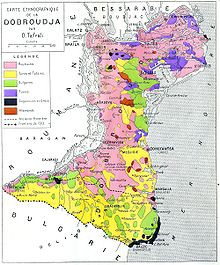The population exchange between Bulgaria and Romania was a population exchange carried out in 1940 after the transfer of Southern Dobruja to Bulgaria by Romania. It involved 103,711 Romanians, Aromanians and Megleno-Romanians living in Southern Dobruja and 62,278 Bulgarians from Northern Dobruja. After this operation, the application of a population exchange in other cases such as Transylvania was considered.

History
editIn 1913, the Kingdom of Romania conquered Southern Dobruja after the Bulgarian defeat in the Second Balkan War. The country had already acquired Northern Dobruja in 1878. This sparked revisionist feelings in Bulgaria. Following the occupation of the Romanian regions of Bessarabia and Northern Bukovina by the Soviet Union in June 1940, Romania sought protection among the Axis powers, but it was demanded to first resolve its territorial disputes with its neighbors. Thus, on 30 August, Romania ceded Northern Transylvania to Hungary in the Second Vienna Award, while at the Treaty of Craiova of 7 September, Romania returned Southern Dobruja to Bulgaria.[1]
Unlike Northern Transylvania, Southern Dobruja was seen as much less important by Romanian nationalists. Those ethnic Romanians who remained in Northern Transylvania were encouraged to remain there, and some nationalists promised to reconquer the region.[2] On the other hand, in Southern Dobruja, the Romanian authorities insisted on carrying out a population exchange with Bulgaria.[3] A total of 103,711 Romanians living in the region were transferred to Romania, while 62,278 Bulgarians native to Northern Dobruja were evacuated to Bulgaria.[4] The Aromanian settlers, most of whom were native to Greece, were counted as Romanians and therefore left the zone as well.[5] The same thing happened to the Megleno-Romanians from the region. These were settled in the village of Cerna, where they replaced the native Bulgarian population.[6] The population exchange was carried out in compliance with the international laws of the time.[2] Romania also proposed to exchange the rest of their respective minorities still residing outside Dobruja in the two countries, but Bulgaria did not approve this.[4]
After the population exchange, in Romania, out of the 21,897 mostly peasant families that arrived, 11,678 were settled in Northern Dobruja, while the rest were settled in groups all over the country where land was available for them.[2]
Aftermath
editThe population exchange, perceived by some Romanian government figures of the time as a success, gave the idea more popularity in Romania. In fact, some people like Sabin Manuilă planned to carry out another one between Hungary and Romania to solve the Transylvanian dispute, but this never happened.[2][7]
See also
editReferences
edit- ^ Hitchins, Keith (2014). A concise history of Romania. Cambridge University Press. pp. 1–327. doi:10.1017/CBO9781139033954. ISBN 9780521872386.
- ^ a b c d Solonari, Vladimir (2007). "An important new document on the Romanian policy of ethnic cleansing during World War II". Holocaust and Genocide Studies. 21 (2): 268–297. doi:10.1093/hgs/dcm039.
- ^ Bolovan, Sorina; Bolovan, Ioan. "Inițiative românești privind problema schimbului de populație în primii ani ai celui de'al Doilea Război Mondial (1939–1941)" (PDF) (in Romanian). pp. 90–116.
- ^ a b Deletant, Dennis (2006). Hitler's forgotten ally: Ion Antonescu and his regime, Romania 1940-1944. Palgrave Macmillan. pp. 1–376. ISBN 9781403993410.
- ^ Costea, Maria (2009). "Aplicarea tratatului româno-bulgar de la Craiova (1940)". Anuarul Institutului de Cercetări Socio-Umane "Gheorghe Șincai" al Academiei Române (in Romanian) (12): 267–275.
- ^ Țîrcomnicu, Emil (2014). "Historical aspects regarding the Megleno-Romanian groups in Greece, the FY Republic of Macedonia, Turkey and Romania" (PDF). Memoria Ethnologica. 14 (52–53): 12–29.
- ^ Achim, Viorel (2001). "The Romanian population exchange project elaborated by Sabin Manuilă in October 1941". Annali dell'Istituto Storico Italo-germanico in Trento. 27: 593–617.